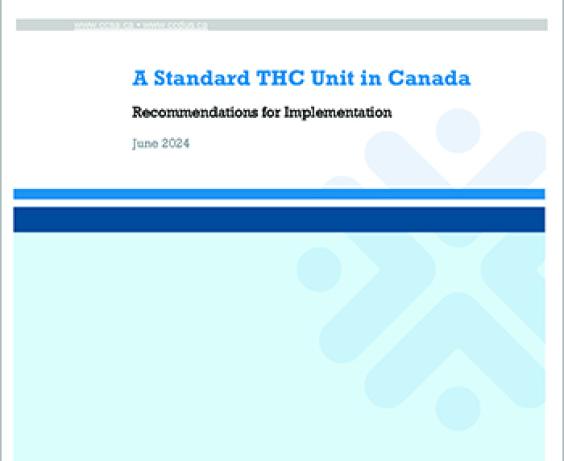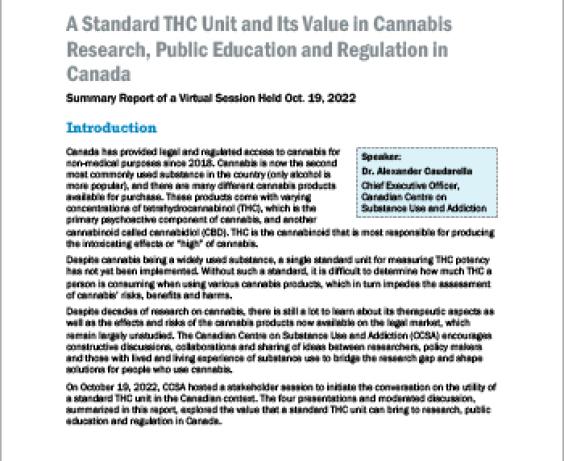Closing the Gaps: Cannabis Research Funded Projects
The Canadian Centre for Substance Use and Addiction (CCSA) funded 19 cannabis research projects on subjects ranging from cannabis legalization and mental health to a comparison of legal versus illicit cannabis sales.
With Health Canada’s support, each project received funding of up to $100,000 over two years. The Mental Health Commission of Canada contributed an additional $100,000 to support awarded projects with a mental health focus for a combined research investment of $1.8 million.
Advancing Knowledge and Measurement
Project Summaries
Addressing Potential Negative Impacts from Cannabis Legalization Self-Directed Intervention for Cannabis Misuse
Bridging the Gap: Veterans and Recreational Cannabis Use
Cannabis and Polysubstance Use
Cannabis Use Among Indigenous Peoples of Turtle Island: Motives for Use, Substitution and Impacts of Legalization
Changes in Substance Use and Mental Health in Two Hospital-Based Addiction Treatment Programs Over the Course of Recreational Cannabis Legalization in Canada
Choice Modelling Study to Explore Canadian Consumer Preferences for Attributes of Cannabis Products and Purchase Experiences
Evaluating the Short-Term Impacts of Cannabis Legalization on Alcohol Consumption, Co-occurring Cannabis and Alcohol Consumption, and Alcohol Consequences Among Adolescents and Adults in Ontario
An Examination of the Sex-Specific Psychophysiological Markers of Risk for Physical and Mental Health Problems Across Modes of Cannabis Use
A Gender- and Age-Based Analysis of Cannabis Use for Pain and Mental Health in a Large Canadian Naturalistic Sample
Health Warnings, Product Labelling Regulations and Consumer Understanding of the Health Risks of Cannabis
The Impact of Accurate Knowledge about Vaping and Public Health Initiatives on Cannabis Use Habits of Emerging Adults
Impacts of Canada’s Recreational Cannabis Legalization on Youth Cannabis Use and Medical Cannabis Consumption
Public Health Outcomes of Cannabis Supply Sources: Examining the Evidence among Quebec Cannabis Consumers
Transitioning to the Legal Cannabis Market in Canada
Understanding Cannabis-Related Physical and Mental Health Presentations to the Emergency Department Following Legalization of Non-Medical Cannabis Use
Understanding the Relationship Between Recreational Cannabis Use and Mental Health in a Marginalized Population
Understanding Cannabis Use and Perceptions in Patients with Mood and Anxiety Disorders
Understanding Responsible and Harmful Cannabis Use
Wading through the Weeds: A Public Health Response to Supporting Pregnant and Breast/Chest Feeding People Who Consume Cannabis
Closing More Gaps
This initiative was an extension of the Closing the Gaps funding stream to further explore knowledge gaps around the impact of legalization of non-medical cannabis on public health and safety.
Project Summaries
Cannabis Use Patterns and Behaviours During the COVID-19 Pandemic in Canada: A Multi-Wave Analysis of the National Cannabis Survey
Investigating the Impacts of Cannabis Retail Policy on the Health of Canadians: evidence generation using pan Canadian health administrative data
The Physical Availability of Cannabis Stores and Cannabis Use and Harms: A Systematic Review
A Roadmap for Cannabis Equity in Canada to Inform the Legislated Review of the Cannabis Act by the Centre on Drug Policy Evaluation
Understanding The Experiences of Young People And Cannabis Use Treatment In Alberta: An Exploratory Qualitative Case Study
Partnerships in Cannabis Policy Evaluation (PCPE) Grants
To meet the need for research to inform policy and regulatory models for non-medical cannabis use, CCSA and the Canadian Institutes for Health Research Institute of Neurosciences, Mental Health and Addiction (CIHR-INMHA) created the Partnerships for Cannabis Policy Evaluation (PCPE) funding opportunity.
The program, funded by CCSA, was developed under CIHR’s Integrated Cannabis Research Strategy. It supported projects that evaluated and monitored the implementation and impact of cannabis-related policies at the provincial and territorial levels, to identify best practices from public health and safety perspectives.
See the links below …
To learn about the research projects undertaken by the five funded teams
To access What We Heard: Knowledge Exchange Interim Report
To access What We Heard: End-of-Grant Knowledge Exchange Report



